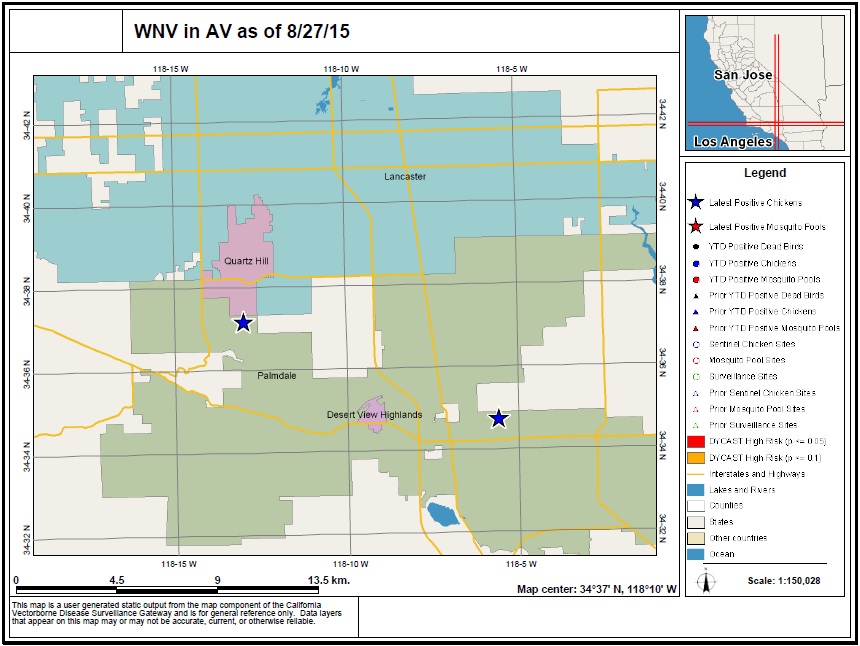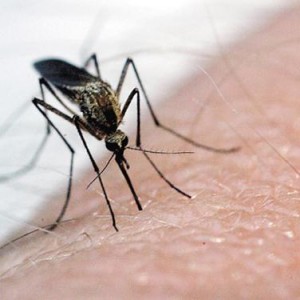 PALMDALE – The Antelope Valley Mosquito and Vector Control District confirmed Thursday that a sentinel chicken from a flock in east Palmdale tested positive for West Nile Virus, the second positive test for the virus this year.
PALMDALE – The Antelope Valley Mosquito and Vector Control District confirmed Thursday that a sentinel chicken from a flock in east Palmdale tested positive for West Nile Virus, the second positive test for the virus this year.
“We utilize 10 flocks of chickens that are strategically located around the Antelope Valley to monitor for West Nile Virus,” said District Manager Cei Kratz. “When our chickens test positive, we know that there are infected mosquitoes in that area.”

The first sign of the mosquito-borne disease in the AV for 2015 was detected last week, when a chicken from a sentinel flock in Rancho Vista tested positive for West Nile Virus.
Residents should protect themselves against mosquito bites and remove standing water to avoid creating mosquito habitat, District officials warn.
West Nile Virus is transmitted by the bite of an infected mosquito. Most people who are infected do not show any symptoms, however, West Nile Virus is a potentially debilitating disease. Even mild cases of West Nile fever can cause patients enormous pain and discomfort for months. Older adults and those with weakened immune systems are at greater risk for complications than others. In 2013, West Nile Virus contributed to the death of a West Lancaster man in his 70s. [Read more here.]
The California Department of Public Health, as of Aug. 26, reported West Nile Virus activity from 39 counties in 552 dead birds, 1,768 mosquito samples, and 150 sentinel chickens, as well as 57 human cases with two deaths.
District officials are urging residents to follow these tips to avoid getting mosquito bites and West Nile Virus infection:
- Check your property for any standing water from sprinklers or thunder showers, and dump or drain all standing water.
- Dress in light-colored long-sleeved clothes during mosquito activity. Mosquitoes are most active at dusk and dawn.
- Defend against mosquitoes by use repellents (i.e., DEET, Picaridin, oil of lemon eucalyptus, IR3535).
- Turn on fans to keep mosquitoes away.
- Keep screen doors and windows in good repair and close them.
- Don’t use bug zappers near your patio – they attract more mosquitoes than they kill.
- Get free mosquito-eating fish (Gambusia affinis) for fish ponds, pools and horse troughs.
- Vaccinate your horses properly.
- Report stagnant pools and other backyard sources to the AVMVCD.
- Report dead birds by calling 1-877-WNV-BIRD (877-968-2473) or online at www.westnile.ca.gov.
To stay up-to-date on West Nile Virus activity and mosquito-related information in the Antelope Valley, visit www.avmosquito.org.
For more information, call 661-942-2917.
[Information via news release from the Antelope Valley Mosquito and Vector Control District.]
–
Previous related story: First sign of West Nile Virus in the AV for 2015
RVA says
This is the best image resolution you could’ve posted? If you are going to include a map to augment the story, perhaps you might post one that can actually be read.
Jean nasser says
I worry about the continuous standing water just west of 60th west on avenue L. Across from a high school. I live at MAyflower gardens Ave L_12 and 65th west and there have in the past mosquitoes around my door frame. Not so much this year as in the past.
AV Mosquito says
We check and treat the area every week and try to keep mosquitoes down. If you are still having a problem, please contact our office to let us know.
The thunderstorms a few weeks ago created standing water in places that are usually dry and some are taking a long time to soak in or evaporate.